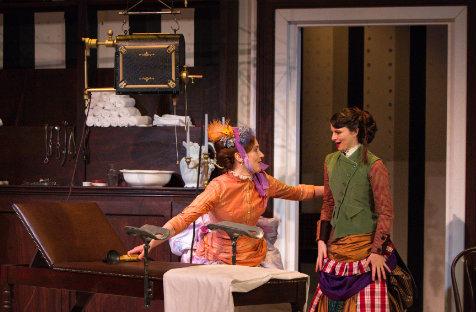The title of this play is no misprint; this play is, indeed, about the invention of the vibrator, hot on the heels of the invention of electricity – thank you, Mr Edison!
Dr Givings (Renato Musolino) provides women – and, on occasion, men – with a means and method for treating ‘hysteria’ – a condition apparently brought on by the build-up of fluid in the womb, and treated by the application of a electric vibrating device to the privates (or the prostate, for men). Ably assisted by his midwife assistant, Annie (Katherine Fyffe), Dr Givings is treating Mrs Daldry (Lizzy Falkland).
In the next room, forlorn and suffering from post-natal depression, his wife, Catherine (Amber McMahon) struggles to come terms with her inability to feed their child. Through his new patient, the Givings find a wet nurse (Pamela Jikiemi) to help care for their child. This relationship sparks the interest of a young artist (Cameron Goodall) who has come to see if Dr Givings can help him relieve his ‘hysterical blindness’ and return him to his former artistic prowess.
As each member of this impressive cast takes a turn with Dr. Givings apparatus, their eyes – and indeed their emotions – are opened and enlivened and the passion and pleasure skews their Victorian morality, challenging the ideals they hold so dear.
Catherine Fitzgerald’s swan song as Artistic Associate at the STCSA is a powerful, emotive, hysterical (in more ways than one) piece by American playwright, Sarah Ruhl. Each member of the cast works the script’s word play for all it’s worth and Amber McMahon as Catherine, and Renato Musolino as Dr Givings are an excellent comic juxtaposition – Renato is as staid as Amber is enlivened. (Their pairing is reminiscent of Lucille Ball, at the height of her comic prowess, combating the stoic Desi Arnaz).
The use of increasingly brightening colours in the period costumes hints at the veil that is removed from the eyes of the hysterical – and the wondrous new world of fulfillment they discover. Poor Mr Daldry (Brendan Rock) meanwhile remains locked in a sea of beige, unaware of the changing world around him.
While this is a period piece, it speaks volumes of the emotionally stunted world in which we live – and the use of technology to ‘connect’ with people – even those sitting directly opposite. The enforced abstinence of the Victorian Era is now forced upon us as we ‘seek’ that perfect partner across the internet, or communicate in text, rather than words or touch.
In the Next Room is a lengthy piece, but is guaranteed to provide satisfaction, titilation, laughter and, possibly, tears. Reconnect with the living – and live theatre – and feel the electricity.
Rating: 4 ½ stars out of 5
In the Next Room or the vibrator play
Written by Sarah Ruhl
Director: Catherine Fitzgerald
Designer: Ailsa Paterson
Lighting Designer: David Gadsden
Composer: Catherine Oates
Cast: Lizzy Falkland,
Katherine Fyffe, Cameron Goodall, Pamela Jikiemi, Amber McMahon, Renato
Musolino and Brendan Rock
The Dunstan
Playhouse, Adelaide Festival Centre
3 – 24 November





